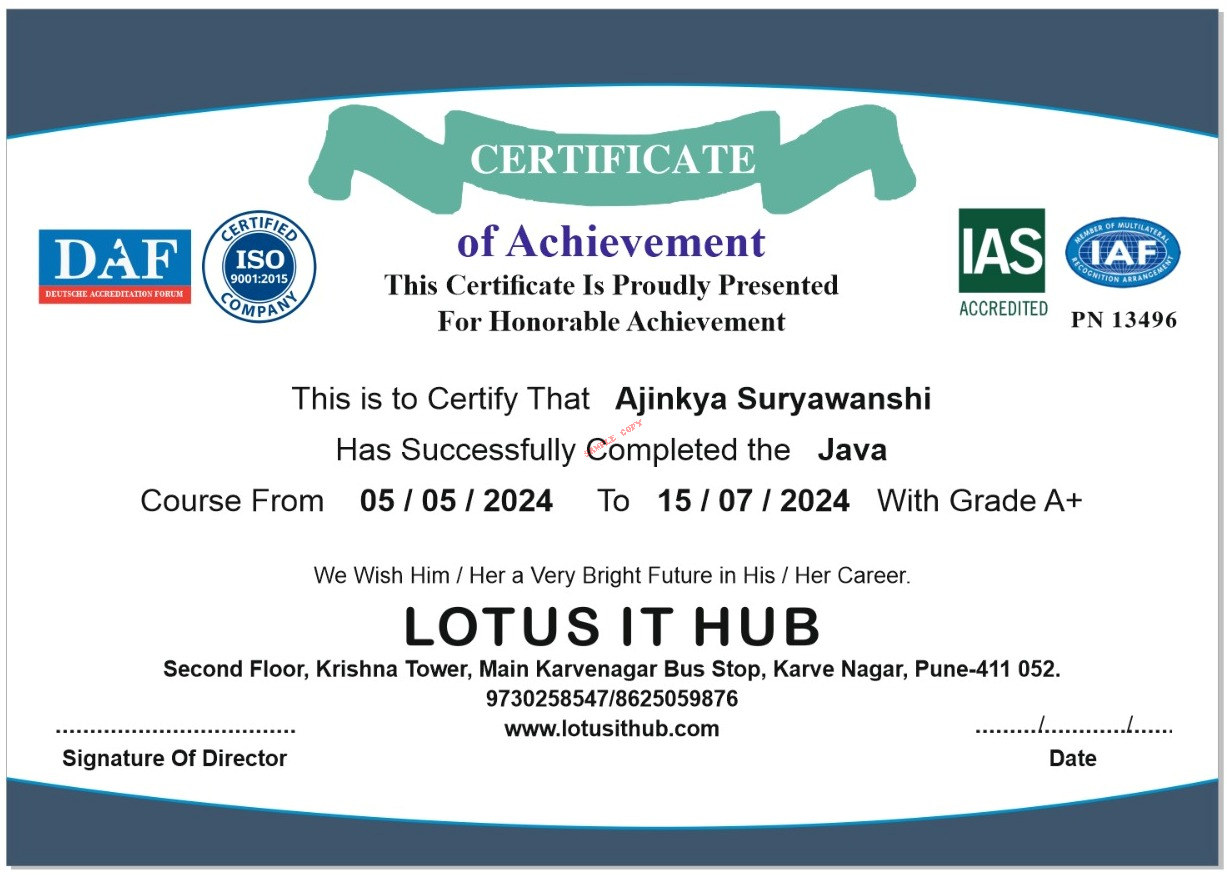Comprehensive Data Analyst Classes in Nagpur!
The comprehensive and well-planned curriculum of the Data Analyst Classes in Nagpur is intended to teach students the academic understanding and real-world skills they need to succeed in the field of data analysis. The programmers design to cover both basic and advanced data analytics approaches guarantees a comprehensive education.
Introduction to Data Analytics
Beginning with a thorough introduction to data analytics, the course covers the meaning, importance, and practical uses of data analytics. The several kinds of data analytics—descriptive, diagnostic, predictive, and prescriptive—are explained in this lesson, together with their special goals and approaches. It offers a summary of the many industries—healthcare, banking, marketing, and others—that use data analytics. Furthermore, students comprehend the main duties and necessary abilities of a data analyst, like critical thinking, problem-solving, and good communication.
Data Collection and Preprocessing
Data Collection and Preprocessing explores the various data collection sources and techniques. Students study methods for collecting data from databases, APIs, web scraping, and learning how to differentiate between structured and unstructured data. The need for data cleaning and preparation is emphasized, along with techniques for handling missing values, transforming data, and normalizing datasets to guarantee consistency and quality of the data. Furthermore, data integration methods are covered in the curriculum, which concentrates on combining data from several sources to produce a single dataset for analysis.
Hypothesis testing and Statistical Analysis
Statistical Analysis and Hypothesis Testing give students a strong basis for statistical ideas. Among the descriptive statistics they study are measures of dispersion (variance, standard deviation) and measures of central tendency (mean, median, mode). Introduced in this course are the normal, binomial, and Poisson probability distributions, as well as Bayes' theorem. Additionally, a major emphasis is hypothesis testing, where students learn how to develop null and alternative hypotheses, comprehend Type I and Type II mistakes, and analyze p-values. To make judgments motivated by data, they practice using a variety of testing techniques, including t-tests, chi-square tests, and ANOVA.
Data Visualization
The Data Visualization module covers the fundamentals and best practices for producing effective visualizations. Students explore a variety of Visualization applications, including Seaborne, Matplotlib, Power BI, Tableau, and Excel. They pick up skills to make bar charts, histograms, scatter plots, and line graphs, among other kinds of charts and graphs. The course also covers sophisticated Visualization methods such as topographical maps, tree maps, and heat maps. Learners get experience creating dynamic data exploration interactive dashboards. This course stresses the value of visual storytelling and teaches students how to effectively and persuasively communicate data insights to different audiences.
SQL for Data Analysis
Starting with the foundations of SQL and database management systems, the best data analyst courses in Nagpur offers an extensive lesson on SQL for Data Analysis. SELECT, INSERT, UPDATE, DELETE, and several joins (inner, left, right, complete) and sub queries are among the SQL queries that students learn to create and optimize. Furthermore, advanced SQL methods, including indexing, common table expressions (CTEs), and window functions (ROW_NUMBER, RANK, DENSE_RANK), are discussed. Effective retrieval and manipulation of data kept in relational databases require these abilities.
Programming for Data Analysis
Programming for Data Research introduces students to Python and R, two crucial programming languages for data research. Students learn data manipulation and analysis skills using Python modules, including Pandas, NumPy, SciPy, and Matplotlib. The course also covers statistical modeling and data manipulation in R, with an emphasis on dplyr, ggplot2, and caret. Students work with these programming languages on projects including data cleansing, transformation, and exploratory data analysis (EDA).
Machine Learning Basics
The Machine Learning Basics section provides an introduction to machine learning ideas and methods. Students study reinforcement learning, unsupervised learning (clustering, association), and supervised learning (regression, classification), among other machine learning approaches. The online data analyst courses in Nagpur cover fundamental techniques like support vector machines, k-means clustering, decision trees, logistic regression, and linear regression.
Big Data Technologies
Students explore the properties and problems of large data in the large Data Technologies module. They work directly with big data applications such as Pig, Spark, Hadoop, and Hive. The course teaches students how to handle and analyze massive datasets using Spark's RDDs (Resilient Distributed Datasets), Data Frames, and Spark SQL. They get knowledge on the Map Reduce and HDFS (Hadoop Distributed File System) components of the Hadoop ecosystem and how to query huge datasets with Hive. This course will prepare students to work in large data contexts and complete scalable data analysis assignments.
Management of Projects and Communication
For data analysts, project management and communication abilities are essential, and this module addresses both. From preparation and implementation to monitoring and reporting, students study the lifecycle of data analytics projects. With training in report writing and data storytelling, the emphasis is on effective communication of data insights. Students get to practice delivering their analysis and Visualizations to various audiences so they can communicate intricate data findings. In order to guarantee responsible data management, the course also covers data privacy concerns and ethical problems, such as GDPR compliance and data anonymisation methods.
Capstone Project in the Online Data Analyst Training Institute in Nagpur
At the course's conclusion, students tackle a practical challenge using what they have learned. They write up a project proposal, design a strategy for gathering data, and carry out in-depth modelling and data analysis. Through the project, students must combine a variety of methods and resources from the course, including machine learning, SQL, Python/R, and data Visualization. As the last stage, they must prepare and give a thorough analysis report and presentation that shows they can manage intricate data analysis projects from beginning to end. Together with offering students invaluable experience, this capstone project creates a portfolio item they may provide to prospective employers.
Certification and Placement Support in the Online Data Analyst Classes in Nagpur
Participants who finish the course are awarded a Course Completion Certificate, which certifies their data analytics knowledge and abilities. Along with resume creation, interview preparation, and job placement support, the training also provides placement help. Career services provide a seamless entry into their jobs as data analysts by helping students create polished resumes, get ready for interviews, and establish contacts with possible companies.
Students will leave the course having gained a thorough grasp of data analysis methods, hands-on experience with industry-standard tools, and the assurance to use their knowledge in practical situations. Grads of this intensive training are invaluable assets to any company as they are guaranteed to be ready to satisfy the needs of the data analytics sector.
FAQ - Frequently Asked Questions
💬 Talk to Adviser
Get expert guidance from our experienced professionals in every field.
Skills & Tools You'll Learn
Programming Fundamentals
- Algorithms & Data Structures
- Problem Solving
- OOP Concepts
- Version Control (Git)
Development Tools
- IDEs & Text Editors
- CLI & Terminal
- Package Managers
- Build Tools
Software Practices
- Agile & Scrum
- Testing (Unit & Integration)
- Code Reviews
- CI/CD Workflows
Platforms & Technologies
- Databases (SQL/NoSQL)
- Cloud (AWS, GCP)
- APIs (REST & GraphQL)
- Docker & Kubernetes
Our Certifications
Gain globally recognized certifications that validate your skills and boost your career.
Earn Your Achievement Certificate

After completing your course, you’ll receive a verified certificate from Lotus IT Hub, showcasing your mastery of industry-relevant skills. This certificate can be shared on LinkedIn, added to your resume, and helps you stand out in the job market.
- Globally recognized certificate
- Verification ID for authenticity
- Downloadable digital format
- Shareable on LinkedIn & portfolios
Why Choose Lotus IT Hub
Empowering your career through expert training
Affordable & Customized Programs
Flexible pricing and learning plans
Hands-On Project Learning
Real-world practice to boost your skills
One-on-One Mentorship
Personalized guidance from industry experts



